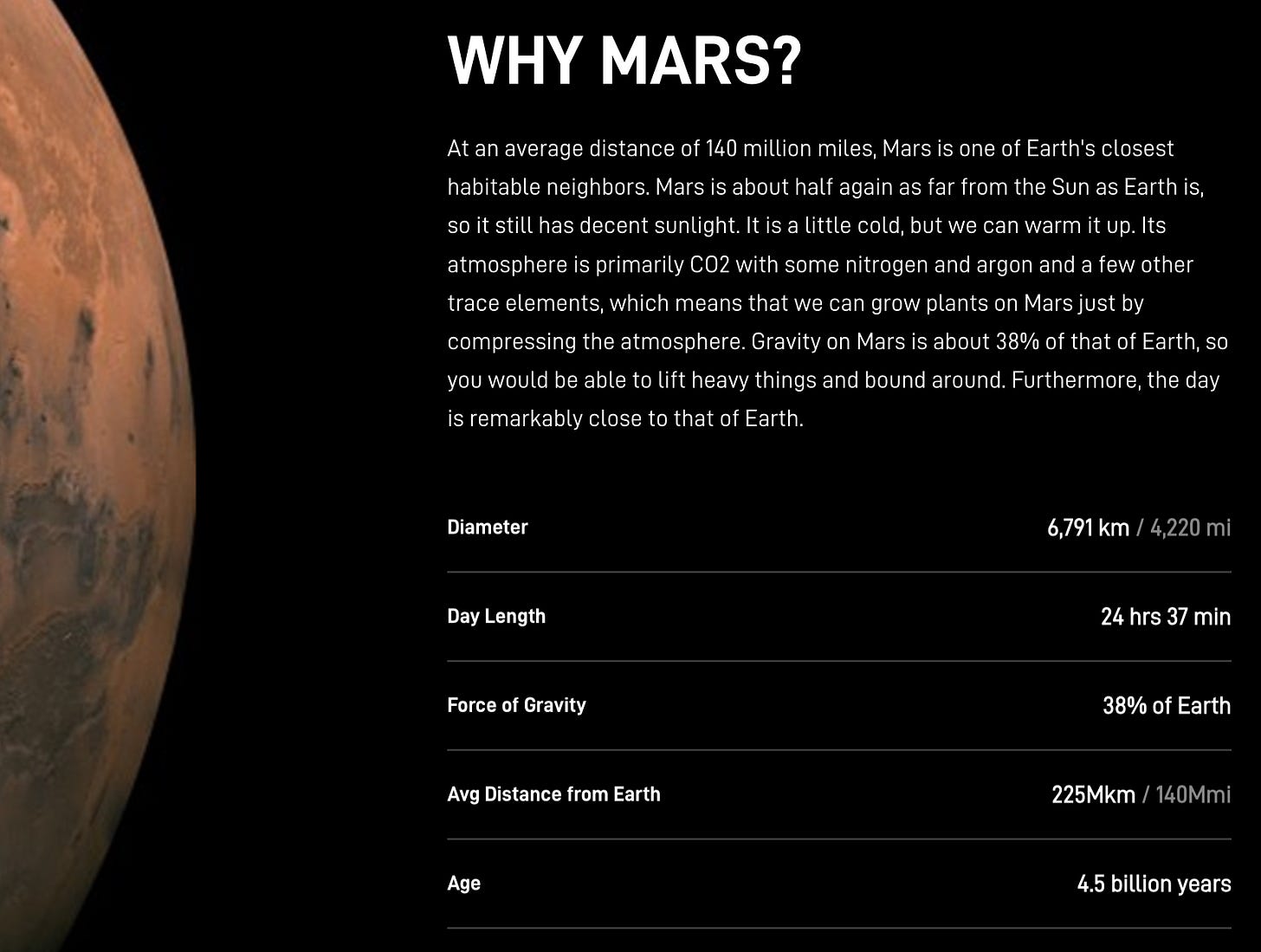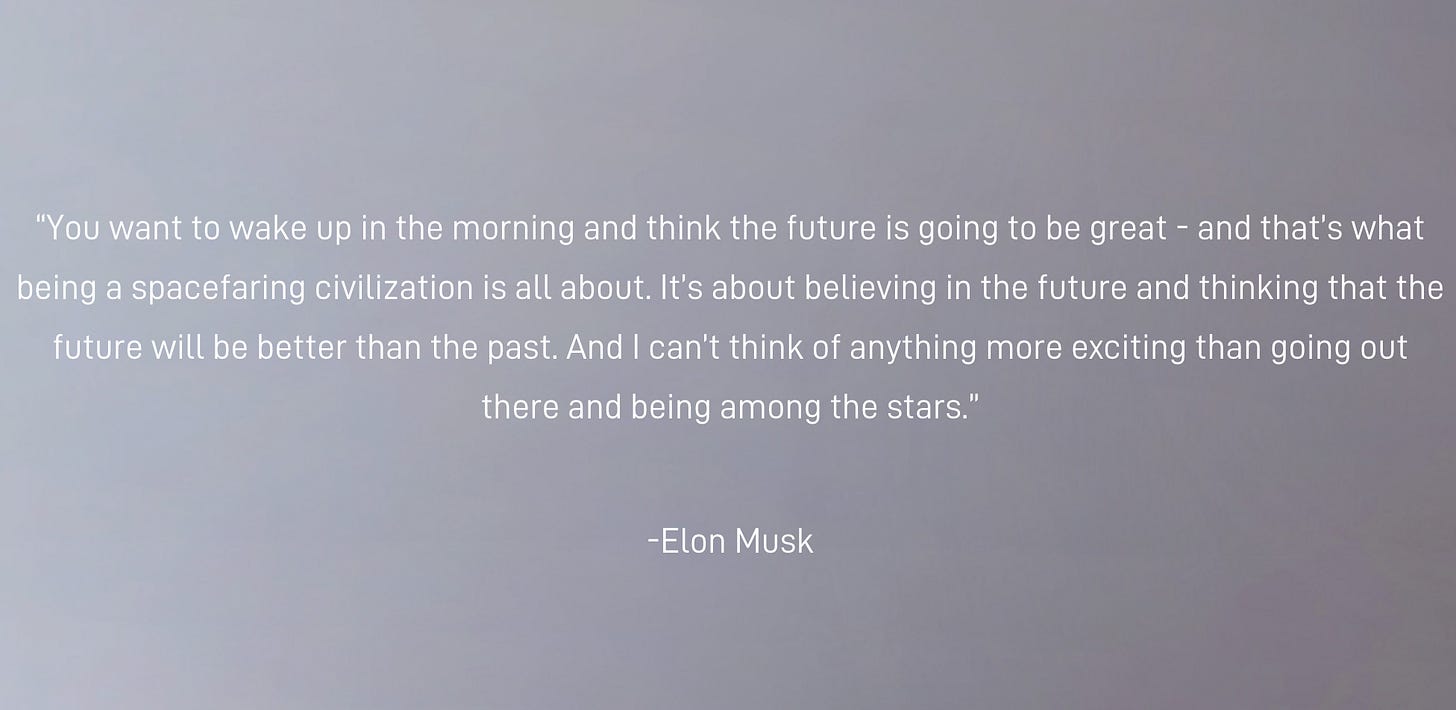Some people actually believe we are going to colonize Mars.
How, you may ask.
“Because Elon Musk is a genius”
Okay. But, like, how exactly are we going to colonize Mars?
“We already have the technology for the rockets, it’s only a matter of time”
Right.
So, let’s look at the plan to colonize Mars and see if it is based on solid science. Here’s the Mars page from SpaceX. It’s super short, and the plan seems to end the moment they land on Mars?!
This is actually on the SpaceX website:
Oh boy.
“Mars is one of the Earth’s closest habitable neighbors”
Mars is not habitable.
“Mars is about half again as far from the Sun as Earth is, so it still has decent sunlight”
What is this, a ketamine-fueled attempt at astronomy?
“Its atmosphere is primarily CO2 with some nitrogen and argon…which means that we can grow plants on Mars just by compressing the atmosphere”
No, that’s not how it works. It’s not just about cranking up the pressure and calling it a day. Plants need oxygen, the right pressure, and water, none of which Mars has in the right amounts.
Aside from the how, is the why? Why would we want to do this? Here’s an inspirational quote from Elon Musk:
Great. I can think of many more exciting futures than colonizing Mars. You may be interested in learning about what is happening on planet Earth right now as this may shift your priorities a bit regarding the future.
Spoiler alert: Earth might need a little more attention than Mars right now.
Mars – Challenges
Atmosphere
Completely different from Earth, with almost no oxygen or nitrogen, and extremely high levels of carbon dioxide.
Trying to breathe on Mars? Good luck with that. It’s not just the lack of oxygen, it’s like a CO₂ party you’re not invited to. Unless you’re some super-evolved species that breathes carbon dioxide, there’s no air for you. And plants? Not happening either.
Pressure
6 millibars, about 0.6% of Earth’s pressure (at sea level).
Step outside on Mars without a spacesuit, and in just 1-2 minutes, your bodily fluids will start to boil. Ouch. Not exactly the relaxing day at the beach you were hoping for.
Gravity
Only 38% of Earth’s gravity.
Spending months or years in this gravity would turn your muscles and bones into something resembling wet spaghetti.
Magnetic field
Non-existent.
Imagine trying to enjoy a nice, relaxing day on Mars, only to have cosmic rays and solar radiation relentlessly frying you like a Thanksgiving turkey, causing radiation-induced cancers, organ damage, and neurological issues. And if a solar storm decides to pay a visit (as they occasionally do), you’d be dead within hours, wondering why you thought this was a good idea.
Temperature
The average temperature on Mars is -60°C, ranging from 20°C at the equator during the day to -125°C at the poles at night.
Let’s just say that Mars isn't exactly a tropical paradise. Even at the equator, where you'd expect a little warmth, nighttime temperatures drop to -70°C. So your chances of survival are pretty slim.
Distance
At its closest, Mars is 54.6 million km from Earth, the current fastest travel time is 6-7 months. But that only happens every 2 years or so.
A logistical nightmare. Think about the amount of materials you'd need to ship there; food, water, oxygen, habitats, rockets, and all the tools for terraforming. A non-starter.
Okay okay, enough with the negativity. Obviously SpaceX already knows this stuff, so what’s the solution?
The solution is to terraform Mars.
Oh really? That’s brilliant!
So here’s the plan:
There is no plan. There’s a concept of plan. Ideas include releasing greenhouse gases from polar caps with nuclear bombs, using algae and microorganisms to produce oxygen, and using space mirrors to reflect sunlight.
But even if, by some miracle, they manage to terraform Mars, which would take thousands of years, there’s a huge problem: no magnetic field. Without a magnetic field, keeping those greenhouse gases around is like trying to fill a bucket with water that has a giant hole in the bottom. Everything just leaks away. Solar radiation and solar winds will blast the atmosphere off, leaving Mars with zero ability to trap heat.








